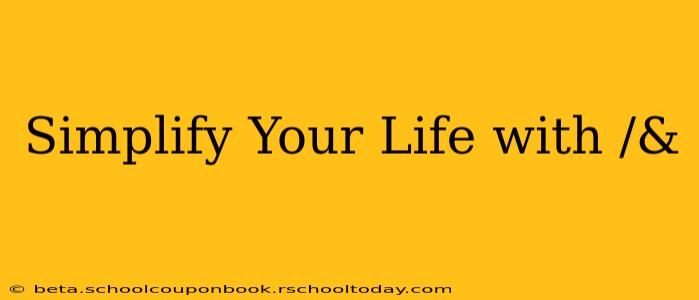Minimalism. The word itself conjures images of stark, empty spaces and a life devoid of joy. But the truth is far more nuanced. Minimalism isn't about deprivation; it's about intentionality. It's about consciously choosing what adds value to your life and letting go of the rest. This approach can profoundly simplify your life, reducing stress, freeing up time, and ultimately, allowing you to focus on what truly matters.
What is Minimalism?
Minimalism is a lifestyle that emphasizes intentionality and purpose. It's not about owning as little as possible; it's about owning only what you need and love. This applies to physical possessions, digital clutter, commitments, and even relationships. The goal is to create space – physical, mental, and emotional – for what truly enriches your life. This might look different for everyone; there's no single "right" way to be a minimalist.
How Can Minimalism Simplify Your Life?
Embracing minimalist principles can dramatically improve various aspects of your life:
Reduced Stress and Anxiety:
A cluttered environment often reflects a cluttered mind. Less stuff means less to clean, organize, and maintain, freeing up mental energy and reducing stress. Knowing exactly where everything is and not having to sift through piles of unnecessary items can be incredibly liberating.
More Time and Freedom:
Less stuff means less time spent cleaning, organizing, and managing possessions. This freed-up time can be dedicated to pursuing hobbies, spending time with loved ones, or simply relaxing and recharging.
Improved Focus and Productivity:
A minimalist environment fosters a sense of calm and clarity, allowing you to focus more effectively on tasks and goals. Without the constant distractions of clutter and excess, you can achieve a greater sense of accomplishment.
Financial Freedom:
Minimalism often leads to reduced spending. By consciously choosing what you buy and avoiding impulse purchases, you can save money and reduce financial stress. This can provide opportunities for investment, travel, or simply greater financial security.
Increased Self-Awareness:
The process of decluttering and minimizing possessions often leads to a deeper understanding of your values and priorities. You become more aware of what truly brings you joy and fulfillment, and what you can easily live without.
Frequently Asked Questions about Minimalism
Here are some common questions people have about adopting a minimalist lifestyle:
Isn't Minimalism Depriving and Sad?
No! Minimalism is about intentionality, not deprivation. It's about focusing on experiences and relationships rather than accumulating material possessions. It allows you to appreciate what you have more deeply, making your life richer, not poorer.
How Do I Start Minimalizing?
Start small! Begin by decluttering one area of your home, like a drawer or a closet. Focus on items you haven't used in a year. Consider the KonMari method, focusing on items that "spark joy." Don't try to do it all at once – gradual changes are more sustainable.
What if I Get Rid of Something I Need Later?
In today's world, replacing items is often easier than ever before. You can always repurchase something if you genuinely need it. The peace of mind gained from a clutter-free space is often worth more than the inconvenience of occasionally replacing something.
Is Minimalism for Everyone?
Minimalism is a personal journey, and what works for one person may not work for another. It's about finding a balance that aligns with your values and lifestyle. There's no "one size fits all" approach.
Embracing minimalism isn't about conforming to a specific aesthetic; it's about creating a life that aligns with your values and priorities. By focusing on intentionality, you can simplify your life and create space for what truly matters. The journey might require some adjustments, but the rewards of a more peaceful, focused, and fulfilling life are well worth the effort.
